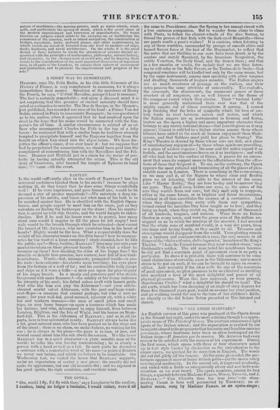THE OPERA.
"OH, could I fly, I'd fly with thee," says Langhorne to the cuckoo. I confess, being no longer a bachelor, I woulcl rather, were it all
the same to Providence, chase the Spring in her annual circuit with a less ominous companion. But to wander from clime to clime
with Pasta, to follow the chariot-wheels of the diva Sontag., to
thread the groves of fair Italy with the dark-eyed Brambilla—these are goods worth a poet's wishes It is curious, when listening to any of these warblers, surrounded by groups of smooth chins and honest Saxon faces at the foot of the Haymarket, to reflect that the notes that are thrilling in our ears have been drunk in by the
sombre and stately Spaniard, by the luxurious Neapolitan, the subtle Venetian, the lively Gaul, and the frozen Russ ; and that in a few months or weeks, the melody that we are thus listening to will echo in the Salle Favart, or the Teatro de la Scala—that congenial emotions will be kindled not only by the same music, but by the same instrument, among men speaking with other tongues and dwelling thousands of leagues asunder. The Italian singers are as much creatures of passage as the cuckoo, and their notes possess the same attribute of universality. The roulades, the crescendo, the diminuendo, the numerous graces of these sweetest of all songsters, are as well known as the theme of the composer round which they cluster. Their " bastard Latin" is more generally understood than ever was that of the mighty empire out of whose corruptions it sprung. I cannot help thinking that the links of sympathy which the love of melody tends to rivet between nation and nation, and which the Italian singers are so instrumental in fbrming and fixing, bestow on the opera a higher and more important character than belongs to any merely national drama—that (sacrilegious as it may appear) Mozart is entitled to a higher station among those whose labours have added to the stock of human enjoyment than Shalespeare, and that Siddons must yield her place to Sontag ! The King's Theatre is decried by those whose ears are dull, as a place of unsatisfactory enjoyment—by those whose spirits are grovelling, as a place of useless expense ; the sour and the sullen regard it as foolish, and the sanctimonious frown on it as irreligious ; and with all who look but to the .surface of things, it passes for an amusement that owes its support more to the affectations than the affections of those that frequent it. To me, on the contrary, the Opera appears the most rational and humanizing of all the places of pleasurable resort in London. There is something in the evanescence, as we may call it, of the Signore to whose clear and flexible pipes we sit listening, that adds to the interest of the scene. Like "Master Bobby," they are here to-day and to-morrow they are gone. They melt away before our eyes, as the notes of the airs they warble from our ears; but they melt only to reappear, either in the sante forms, or in brighter and fairer incarnations, identical in all that constitutes the essence of a cantatrice. And when they disappear, they carry with them our sympathies, twined round the melodies they have taught us to love ; and they , bring us back, when they revisit us, the -sympathies of thousands of all kindreds, tongues, and nations. Were there an Italian theatre in every town, and were the gross ears of the million unstopped so as to relish the musings of the maestri, I feel assured
that the whole sons of mankind would, in a very few years, form one large and loving family, as they ought to do. Treasons and stratagems would disappear from the world. Your plotting rascals
are a taciturn and uncommunicative race, the very reverse in all things of the "dal ce ri dentes, do Ice loquentes," haunters of the King's
Theatre. " I hate the French because they wear wooden shoes," says Goldsmith's soldier. The old man hated his neighbours because he did not find a common point of agreement even in so petty a particular. In dress it is probable there will continue to be some
small distinctions observable, even in the Millennium ; nor is much stress to be put on such, if we can be brought to agree in essenti alibus. And certainly if the idern velle be one of the essentials
of good agreement, no plan promises to be so effectual as instilling into mankind a love of the most delightful and purest of all physical pleasures. Were this love universal, or even general,
Sanctissima ! what a delightful life should we lead ! The
old earth, which has been drooping at an angle of sixty degrees for these five thousand years past, would re-assume her erect position, and go waltzing round the sun to the tune of her children's fiddle, as cheerily as she did before Satan preached or Eve listened and sinned.


















 Previous page
Previous page